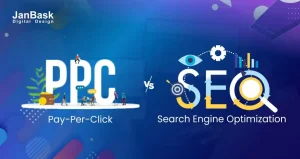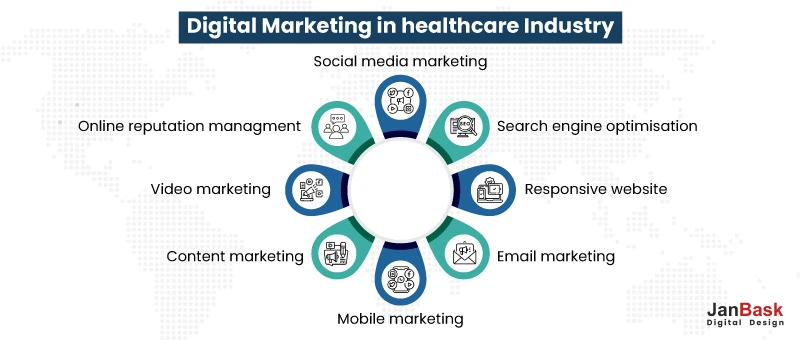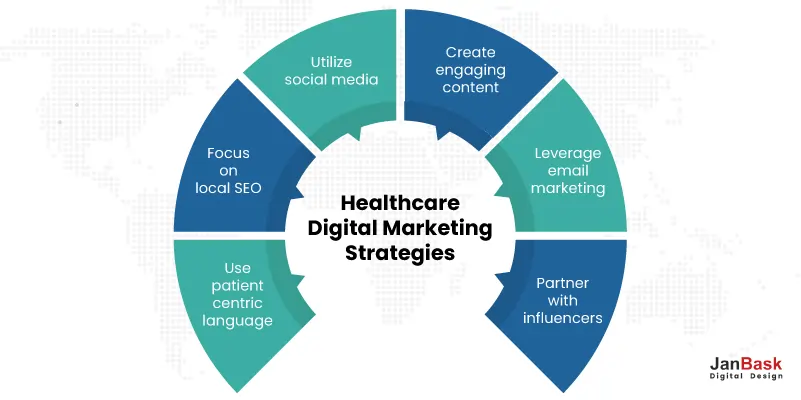
In today's world, digital marketing has become a crucial part of any business, including healthcare. Healthcare digital marketing involves using digital channels to connect with patients, healthcare providers, and healthcare industry members. It is a cost-effective way for healthcare providers to reach their target audience and build their brand.
This blog post will discuss how digital marketing can promote a hospital, the advantages of investing in healthcare digital marketing, digital marketing for healthcare providers, and the essential healthcare marketing strategies healthcare marketers need to create a successful digital marketing program.

Digital marketing for healthcare involves using various digital channels to promote healthcare services, products, and organizations. For example, a hospital can use social media to showcase its services and connect with patients. They can create engaging content, share patient stories, and offer educational resources to their audience. Doing this can increase their online presence and build trust with potential patients.
Another example is email marketing. Healthcare providers can use email to communicate with patients and share relevant information, such as new services, patient success stories, and upcoming events. This can establish a strong relationship with patients and encourage them to return to the healthcare provider for future services.
Content marketing is another critical aspect of digital marketing for healthcare. Healthcare providers can educate their target audience and establish themselves as thought leaders in their respective fields by creating high-quality content such as blog posts, videos, and infographics. For example, pediatricians can create informative blog posts about child health and parenting tips to attract potential patients.
Overall, digital marketing for healthcare is a powerful tool for healthcare providers to connect with patients, build trust, and drive patient acquisition. But how can digital marketing promote the healthcare industry? Read on to find out.

Digital marketing has become essential for hospitals and healthcare organizations to promote their services and attract patients. According to a survey by the Healthcare Leadership Council, over 60% of patients have used the internet to find and research healthcare providers, highlighting the importance of digital marketing in healthcare.
Improving search engine ranking is a critical aspect of digital marketing for hospitals. Using healthcare SEO tips, hospitals can increase their visibility online and rank higher in search results, making it easier for patients to find them. Studies show that the top three search results on Google receive over 60% of clicks, while results on the second page receive less than 1% of clicks.
Targeted campaigns are another way digital marketing can promote a hospital. Hospitals can create campaigns targeting patients interested in a particular medical condition or service using social media advertising or email marketing. For instance, a hospital specializing in cancer treatment can create a social media ad campaign targeting patients interested in cancer treatments or related support groups.
Digital marketing can also help build a hospital's brand by creating informative and engaging content that establishes the hospital as a thought leader. For example, a hospital can create blog posts or videos on healthy living, wellness tips, or new medical breakthroughs. Hospitals can build trust and credibility by providing patients with valuable information and establishing themselves as a reputable healthcare provider.
Overall, digital marketing offers hospitals a cost-effective and measurable way to promote their services, reach their target audience, and build their brand. With the right digital marketing strategies and tools, hospitals can attract and retain patients and stay ahead of the competition in the ever-evolving healthcare landscape.
Investing in healthcare digital marketing can bring several advantages to a hospital or healthcare organization. Let's take a closer look at each of these benefits with examples and statistics:

Digital marketing can help healthcare organizations to improve their online presence and accessibility to patients. For example, by optimizing their website for search engines, healthcare providers can increase their visibility in search results and attract more traffic. According to a survey conducted by Pew Research Center, 72% of internet users say they looked online for health information within the past year. This shows the importance of having a robust online presence in the healthcare industry.
In addition to search engine optimization, digital marketing can also improve accessibility to patients through the use of online scheduling and virtual consultations. For example, during the COVID-19 pandemic, many healthcare providers shifted to telehealth services to provide care to patients remotely. This helped keep patients safe and improved accessibility to care for those who may have difficulty traveling to a physical location.
Digital marketing can also help healthcare organizations establish thought leadership in their industry. Healthcare providers can showcase their expertise and knowledge on specific topics related to their field by creating high-quality content such as blog posts, whitepapers, and case studies. This can build patient trust and position the organization as a leader in the healthcare industry.
For example, Mayo Clinic, one of the largest healthcare providers in the United States, has a robust content marketing strategy that includes a blog, social media, and a YouTube channel.
Through these channels, Mayo Clinic shares valuable health information, educates patients on medical conditions, and highlights its expertise in various fields of medicine.
Digital marketing can also help healthcare organizations build brand awareness and reputation. By consistently producing and sharing valuable content on social media and other digital channels, healthcare providers can increase their visibility and reach a larger audience.
For example, Cleveland Clinic, another prominent healthcare provider in the United States, has a strong presence on social media platforms such as Twitter, Facebook, and Instagram. Through its social media channels, Cleveland Clinic shares health tips, patient stories, and updates on medical research. This has helped the organization build a strong brand reputation and attract new patients.
Digital marketing can also help healthcare organizations increase patient engagement and loyalty. By creating personalized and relevant patient content, healthcare providers can strengthen their relationships with patients and improve their overall experience.
For example, Mount Sinai Hospital in New York City has a patient portal that allows patients to access their medical records, schedule appointments, and communicate with their healthcare providers. The hospital also sends personalized emails to patients about their health conditions and recommended treatments. This has helped to increase patient engagement and loyalty, as patients feel more connected to their healthcare providers and are more likely to follow through with their recommended treatments.
In conclusion, investing in healthcare digital marketing can bring several advantages to healthcare organizations, including improving their online presence and accessibility to patients, establishing thought leadership, building brand awareness and reputation, and increasing patient engagement and loyalty. By utilizing digital marketing strategies effectively, healthcare providers can better serve their patients and grow their businesses.
To create a successful digital marketing program for healthcare, healthcare marketers need to clearly understand their target audience and goals. Here are some essential healthcare marketing strategies that healthcare marketers can use to create a successful digital marketing program:
Healthcare marketers must follow best practices and use proven strategies to create a successful digital marketing program for healthcare. Here are some healthcare digital marketing strategies and best practices that can help healthcare marketers to create compelling digital marketing programs:

In conclusion, healthcare digital marketing is becoming increasingly important in today's digital age. Healthcare marketers must use effective strategies and follow best practices to create successful digital marketing programs that engage patients, promote services, and build trust with the community. By using patient-centric language, focusing on local SEO, utilizing social media, creating engaging content, leveraging email marketing, and partnering with influencers, healthcare providers can make effective digital marketing programs that drive business success.
Janbask, a specialized digital marketing company in the healthcare industry, can assist healthcare providers in creating and implementing effective digital marketing strategies tailored to their specific needs and objectives. With their extensive experience, the Janbask team is well-equipped to deliver results-driven solutions for healthcare organizations. Get in touch with the team at Janbask today for all your healthcare digital marketing services.
Looking for Healthcare Digital Marketing Services?

1. What is healthcare digital marketing?
Healthcare digital marketing uses digital channels, such as social media, email, websites, and search engines, to promote healthcare products and services to patients and the wider community. The goal is to increase brand awareness, engage with patients, and drive revenue for healthcare organizations.
2. What are some common digital marketing strategies used in healthcare?
Some common digital marketing strategies used in healthcare include search engine optimization (SEO), content marketing, social media marketing, email marketing, and pay-per-click (PPC) advertising. Healthcare organizations can use these strategies to reach a wider audience, generate leads, and build patient trust.
3. How can healthcare digital marketing benefit my organization?
Healthcare digital marketing can benefit your organization in several ways, such as increasing your online visibility, establishing thought leadership, building a brand reputation, improving patient engagement, and driving revenue growth. By utilizing digital marketing strategies effectively, healthcare providers can better serve their patients and grow their businesses.
4. Is healthcare digital marketing regulated?
Healthcare digital marketing is subject to various regulations and guidelines, such as the Health Insurance Portability and Accountability Act (HIPAA) and the Federal Trade Commission (FTC) Act. These regulations govern patient data collection, use, and disclosure and protect against deceptive or misleading advertising practices.
5. How can I measure the success of my healthcare digital marketing efforts?
There are several key performance indicators (KPIs) that healthcare organizations can use to measure the success of their digital marketing efforts. These may include website traffic, social media engagement, email open and click-through rates, lead generation, patient reviews, and revenue growth. By tracking these metrics, healthcare providers can assess the effectiveness of their digital marketing strategies and make data-driven decisions to improve their results.
R
This article provides a comprehensive overview of healthcare digital marketing strategies.
K
Excellent article on digital healthcare marketing.
R
I loved reading this article on healthcare digital marketing.
J
Very informative article.
B
This article was very informative and relevant to my work.
C
This article could benefit from a more in-depth discussion of the challenges and limitations of healthcare digital marketing.